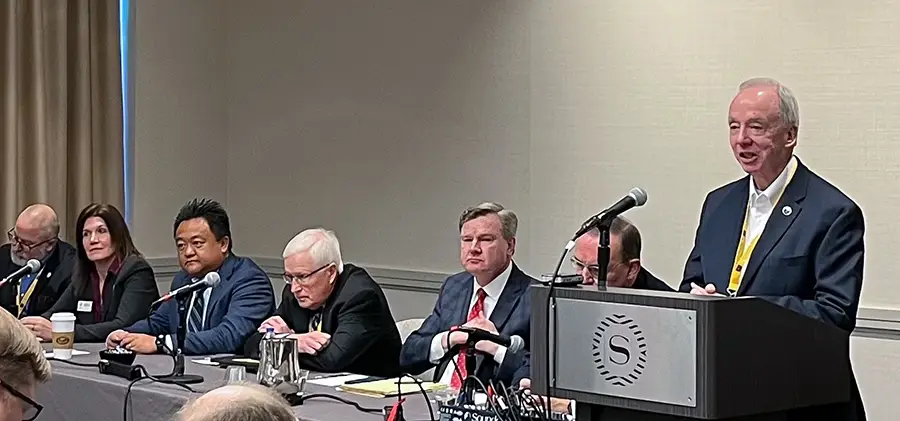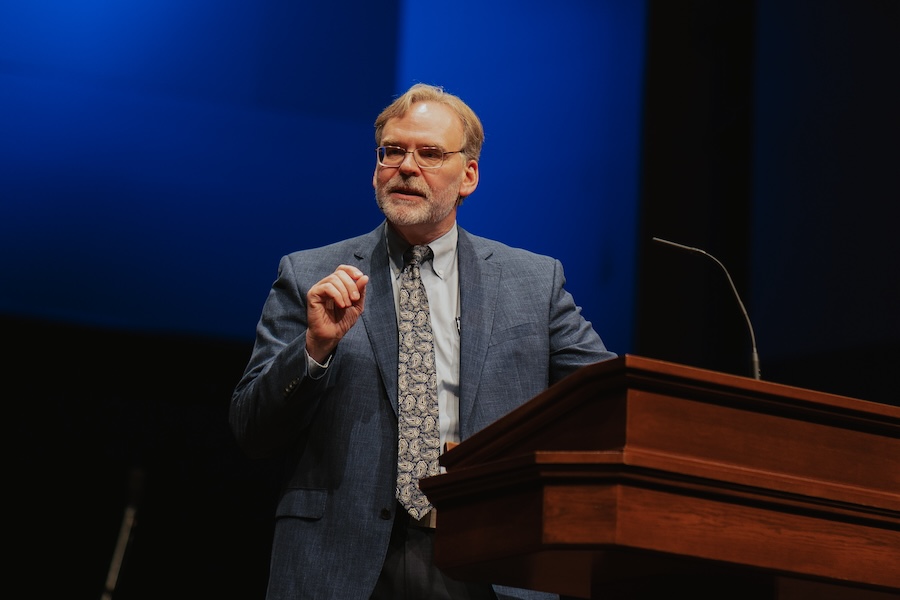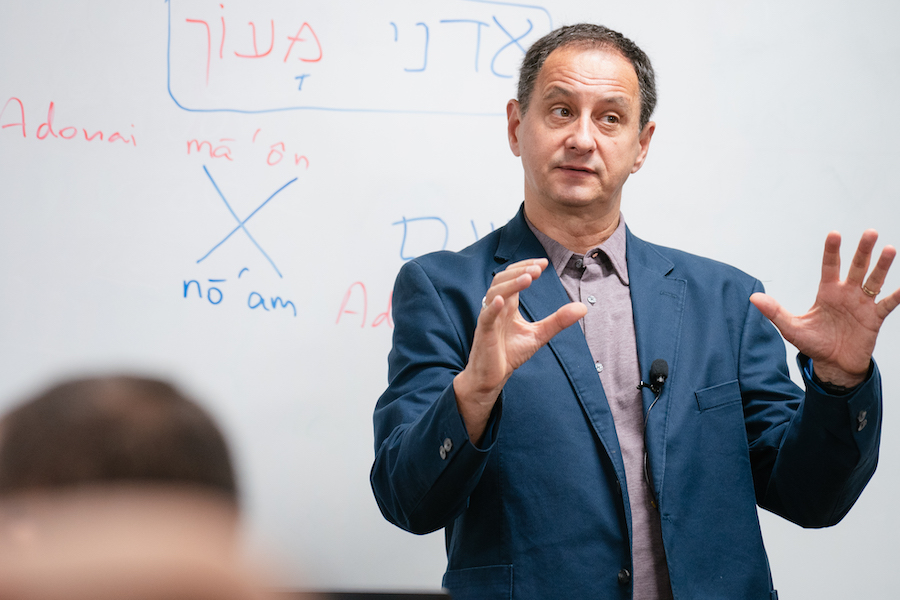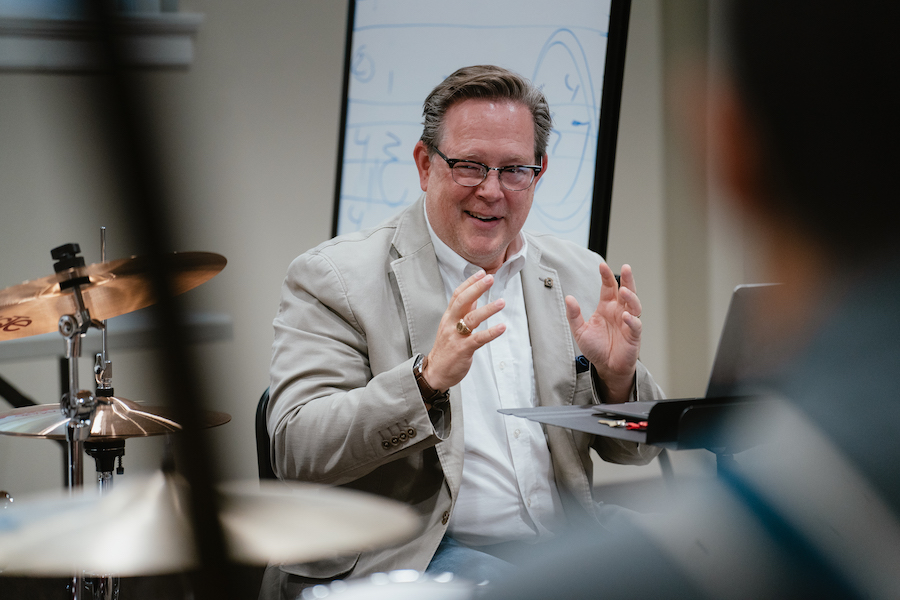Faculty, students represent Southwestern, TBC at annual ETS meeting

Faculty and doctoral students from Southwestern Baptist Theological Seminary and Texas Baptist College represented the Fort Worth institution through 19 paper presentations and moderation of seven panel discussions at the 2022 annual meeting of the Evangelical Theological Society (ETS), held Nov. 15-17 in Denver. The theme of this year’s conference was “Holiness.”
“What a joy it has been to observe our Southwestern colleagues making significant, timely, and beneficial contributions to the work of evangelical scholarship at this year’s annual meeting of the Evangelical Theological Society,” said David S. Dockery, interim president of Southwestern Seminary. “Southwestern faculty and doctoral students have represented Southwestern in admirable ways through their many and various presentations and leadership roles at this year’s annual meeting in Denver, Colorado. These opportunities not only provide Southwestern to contribute to the broader conversations taking place across the evangelical spectrum, but indicate the respect that SWBTS faculty are given by their peers at other institutions.”

Interim President, David S. Dockery, moderated two panels of presentations at the ETS Conference.
Dockery, who moderated two panel sessions during the three days of meetings, concluded a seven-year term on the executive committee of ETS, which included serving as president (2018), serving as chair of the search committee for the new ETS executive director in 2019, chairing the nominating committee, and helping to “frame the major changes in bylaws [that] brought about the incorporation of ETS in recent years,” he said.
“It has been a great joy to serve in this capacity for the good of evangelical scholarship in this country and around the world,” Dockery added. He was recognized for his service to ETS during the banquet at the annual meeting.
Gregory A. Wills, dean of the School of Theology and professor of church history and heritage, presented “Southern Baptists, Slavery, and Secession,” a topic he has “been researching for my history of Southern Baptists book project and for a chapter that I wrote in a forthcoming book on Baptist political thought, and because it is one of the most difficult and contested issues in our history.”
In his presentation, Wills said he “surveyed a wide swath of original sources in which Southern Baptist leaders argued explicitly that they supported secession and the Confederate cause in the Civil War in order to preserve slavery.” He observed the importance of this “because it has long been argued that they did not support secession and war in order to preserve slavery.”
Recognizing his topic’s relationship to the annual meeting theme, Wills added, “The fact that otherwise godly and faithful Christians endorsed and defended slaveholding requires us to face the issue of the contradictions possible in the existence of indwelling sin in the hearts of believers, and to recognize the role of the broader culture in shaping the conscience of the churches.”
“The Call to Holiness in James, 1 Peter, 2 Peter, and Jude” was presented by Mark Taylor, associate dean of the School of Theology and professor of New Testament. Taylor, who has taught at Southwestern Seminary since 2000, said while “James has been a focus of my teaching for many years,” he has recently “expanded my research to 1 Peter, 2 Peter, and Jude.” He said his paper was a longer version of an article he wrote for the fall 2021 issue of the Southwestern Journal of Theology and an “extension” of the course Exegesis of 1 Peter, 2 Peter, and Jude, which he taught for the first time in the fall 2022 academic semester.
Taylor explained his paper “traced a common theme found in all four letters, namely, holiness as a matter of behavior.” He said his paper accounted for three considerations in the epistles, including “salvation as the necessary condition to godly behavior,” the language used by James, Peter, and Jude “in the development of this theme,” and “the use of the Old Testament in relation to the theme of righteous conduct” as holiness is highlighted “as a significant biblical theme.”
Through his paper, “Recovering the Theology of Practical Theology: Upending the Siloed, Modernist Model,” Interim Vice President for Strategic and Academic Initiatives and Chief Catalyst Officer Michael Wilder, argued, “that the current state of practical theological fields demands a renewed approach to study with the central intention of recovering appropriate biblical and theological foundations.”
Wilder, who is also professor of educational ministries in the Jack D. Terry School of Educational Ministries, noted that practical theological studies should be rooted “in the revealed Holy Scriptures,” but must go further to “examine what an integrated, whole-truth, unfragmented, de-siloed approach to teaching practical theology actually requires” with the “goal of yielding the fruit of a virtuous, wholly formed, vocationally competent minister of the Gospel.”
“Anything less is not genuine Christian theological education,” Wilder added.
Shane Parker, associate professor of leadership and educational ministries in the Terry School and director of online learning, presented “He Paints Holiness: Confession and Repentance within Pastoral Leadership Teams.” Parker noted “shocking headlines of pastoral sin, and the general contemporary lack of direct attention paid to the pastor’s soul and accountability to other leaders” are “ongoing concerns” he has for “students, pastors, and churches.”
Parker added his topic was important to both the academy and the church because “Repentance and confession, in regular practice among pastoral leaders, has been advocated for and practiced in distinct movements and eras of church history. A recapturing of both understanding and implementation of these practices, may prove a safeguard for students, pastors, and churches.”
In his paper, “Jonathan Edwards, Old Princeton, and American Calvinism,” Robert Caldwell III, professor of church history, argued that “Old Princeton’s interpretation and reception of Jonathan Edwards was conditioned largely by its fidelity to the confessions and theological tradition of the seventeenth-century reformed; it was not so much conditioned by reliance upon an Enlightenment philosophy known as Common Sense Realism.”
The paper, which is an essay that will be included in New Perspectives on Old Princeton, 1812-1929, which is set for publication in 2023, enhances theological academia and the church “because it counters a popular thesis which attempts to argue that conservative evangelical theology, a premier example being Old Princeton, is heavily, even exclusively, informed by Enlightenment ideology,” Caldwell said.
“If this were true, then conservative evangelical theology is exclusively a modern phenomenon, with shallow roots,” he added, noting his paper argued “the roots of evangelical theology are much deeper than the eighteenth century,” noting “it has roots in the Reformation, the Early Church, and ultimately in Scripture.”
Matthew McCraney, a Doctor of Philosophy in biblical counseling student in the Terry School, was one of eight Southwestern doctoral students who presented papers at ETS. Originally from Alexandria, Virginia, McCraney is an active-duty senior chaplain for the 7th Special Forces Group in the United States Army. His paper, “Examination of the Moral Model of Disability and Holiness,” noted the negative impact the moral model of disability has on the church’s holiness.
McCraney said he focused on this topic because of “the relative unease that many with disabilities feel in the church.”
“When we look around our churches, we do not see people with special needs or their families at the same rates we see them in the general population,” McCraney observed. “The association of sin with disability drives people away from churches, leading to a negative impact on the church.”
He noted that “when people with disabilities are absent from the church, the body itself becomes disabled. We lose critical voices that disciple and grow the body through their very presence in our midst. Also, when churches assume sin is at the heart of the disabled’s condition, they commit the sin of Job’s friends.”
McCraney added the opportunity to present his research allowed him “to hear from others who found value in what I presented and offered up areas I had not considered for further consideration.”
During the Society of Biblical Literature meeting, Nov. 19-22, in Denver, Southwestern Seminary and Texas Baptist College will be represented by James Wicker, professor of New Testament, Donald Kim, assistant professor of Bible, and Jordan M. Covarelli, a student in the School of Church Music and Worship.
All the faculty and student presenters, and their topics, from Southwestern Seminary and Texas Baptist College are as follows:
Kimberly D. Arnold, Ph.D. student, “A Denominationally Unifying Hymnbook: Three Baptist Hymnbooks in America before the SBC”
Robert W. Caldwell III, professor of church history, “Jonathan Edwards, Old Princeton, and American Calvinism” and panel moderator
David S. Dockery, interim president, distinguished professor of theology, editor of the Southwestern Journal of Theology, director of the Dockery Center for Global Evangelical Theology, panel moderator
Coleman M. Ford, assistant professor of humanities, Texas Baptist College, “A Bond Between Souls: The Relationship Between Friendship and Sanctification in Augustine”
Joshua T. Hebert, Ph.D. student, “Alternate Textual Traditions in the Dialogue with Trypho and the Boundaries of ‘Canon’”
Benjamin Hicks, Ph.D. student, “Food Offered to Idols and the One God: Paul’s Response to an Ignorant Corinthian Argument”
Matthew McCraney, Ph.D. student, “Examination of the Moral Model of Disability and Holiness”
Braden McKinley, Ph.D. student, “The Trinitarian Dynamics of Confession”
Blake McKinney, assistant professor of history and humanities, Texas Baptist College, “The Trans-Atlantic Protestant Bridge: Adolf Keller and the German Church Struggle”
Trey Moss, Ph.D. student, “God is One: Galatians 3:20 and Divine Simplicity”
Shane W. Parker, associate professor of leadership and educational ministries, director of online learning, “He Paints Holiness: Confession and Repentance within Pastoral Leadership Teams”
P. Chase Sears, assistant professor of biblical studies, Texas Baptist College, panel moderator
Jacob Shatzer, associate professor of Christian ethics, “Rejecting a Trajectory Hermeneutic: Ethics and Holiness in Biblical Ethics”
Drew Smith, Ph.D. student, “The Problem of Necessitsim” and “Christo-Logical Controversy: A Response to J.C. Beall’s Contradictory Christology” and panel moderator
Mark E. Taylor, associate dean of the School of Theology, professor of New Testament, “The Call to Holiness in James, 1 Peter, 2 Peter, and Jude”
Joshua Waggener, professor of church music and worship, panel moderator
Sean Matthew Wegener, Ph.D. student, “Criticizing Twentieth-Century Holiness: John Bainbridge Webster’s Definition of Holiness”
Michael S. Wilder, interim vice president for strategic and academic initiatives and chief catalyst officer, professor of educational ministries, “Recovering the Theology of Practical Theology: Upending the Siloed, Modernist Model”
Joshua E. Williams, associate professor of Old Testament, “Narrative Subtlety in Chronicles? The Case of Israel’s Kingdom Dividing”
Gregory Wills, dean of the School of Theology, professor of church history and Baptist heritage, senior fellow of the B.H. Carroll Center for Baptist Heritage and Mission, “Southern Baptists, Slavery, and Secession”
J. Stephen Yuille, professor of pastoral theology and spiritual formation, “Three Beautiful Children: Righteousness, Meekness, and Courteousness in the Saint’s Daily Carriage”



